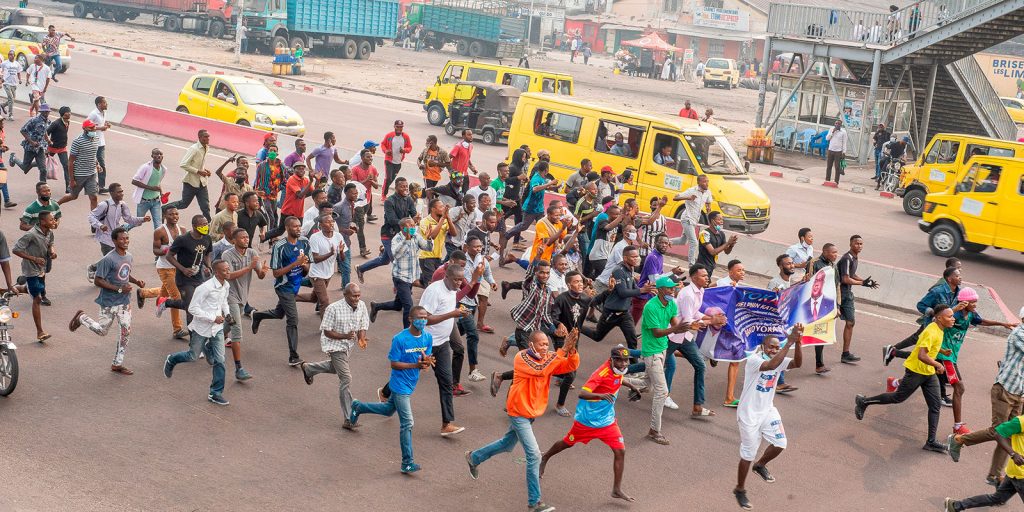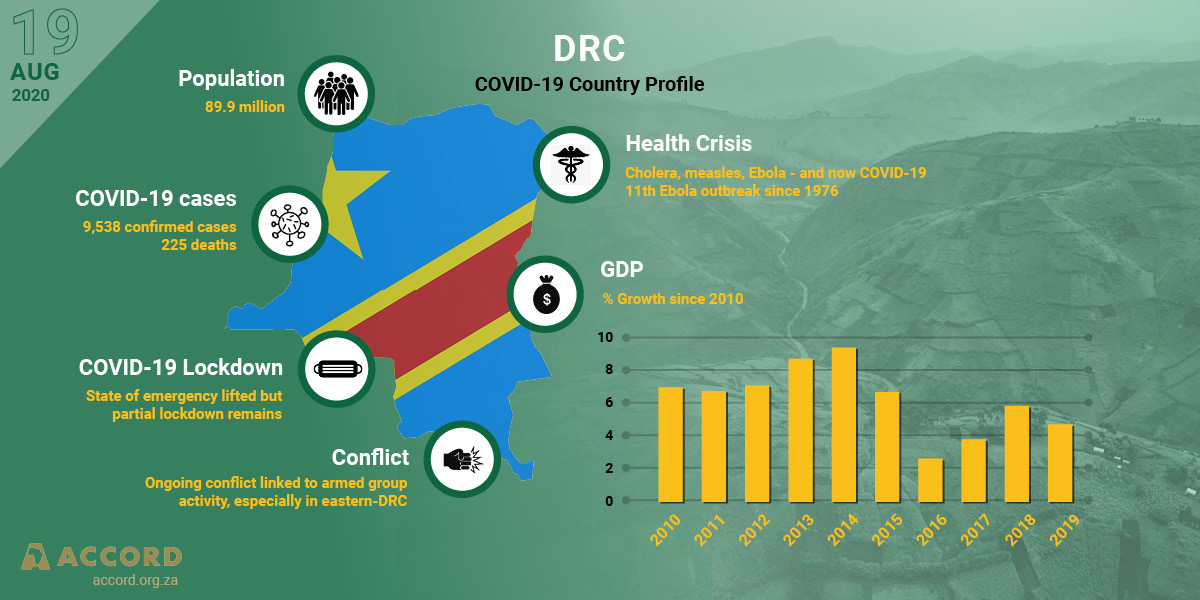The declaration of the coronavirus (COVID-19) as a pandemic by the World Health Organization (WHO) exposed the vulnerability of many countries to this kind of global public health threat. The Democratic Republic of the Congo (DRC) presents an interesting example of how many countries used a national state of emergency to authorise and manage their COVID-19 lockdown period. The fact that the DRC is among the few African countries that have recently declared the end of their COVID-19 national state of emergency – even though the number of cases are high and still increasing – presents important lessons, as well as a reflection on what could make the country more resilient in the post-COVID-19 era.
What lessons can be learnt from the DRC’s decision to declare an end to its COVID-19 national state of emergency? #DRC @DrYvanYenda #C19ConflictMonitor
Tweet
On 21 July 2020, President Félix Tshisekedi decided to reopen the DRC by presenting a plan for progressive sectoral deconfinement. This decision was made after assessing the devastating socio-economic impacts of the state of emergency, which for three months limited economic activities, closed the country to foreign investors and travellers, and restricted social interactions. While the country must still manage and recover from the health and socio-economic impacts of COVID-19, this period has revealed how important trust is between the state and its citizens in generating compliance with the kind of public health emergency measures introduced by the DRC.
Trust and official communication
In the first few months of 2020, when China and several Western countries started to see the economic and health impacts of the COVID-19 crisis, people in the DRC were in doubt whether the country would be severely impacted by the virus. At the time, there were widespread rumours in the DRC, and across Africa, that COVID-19 could not survive in the continent’s warmer climate and was thus a virus that only threatened the northern hemisphere. This reluctance to acknowledge that COVID-19 was indeed a global pandemic; the conflicting information and misinformation about the virus in the early months; and the back and forth accusations between the United States (USA), China and the WHO on the origin and global handling of the pandemic provided fertile ground for unpreparedness and confusion in many communities throughout the DRC. This was in addition to, and further fuelled by, the already fragile political environment in the DRC, which has suffered from a general lack of trust in government institutions and its leadership for years.

For example, the official announcement of the first confirmed COVID-19 case in the DRC by the ministry of health became instantly controversial, since the declared first patient rejected the result of the test and accused health officials of making up cases to attract global attention and funding from international donors and the WHO. This pushback from the patient and the poor handling of the situation in the media by the health ministry did not help. In fact, the narrative spread like wildfire, becoming the primary belief among the majority of the Congolese people – and continues to weaken the government’s effort to prevent the spread of COVID-19 in the country. In the context of the new era of unregulated social media and the rapid spread of both accurate and fake news, the DRC government should have developed a trustworthy communication campaign so that there could have been a credible source for official information to the public.
Institutions and social contract
COVID-19 has also revealed how weak and fragile the social contract is between the DRC government and its population. This reality has long been hidden in the political messaging of hope, future good governance and stable democratic institutions. The agenda behind this political strategy (based on the narrative of a better tomorrow) is an attempt to hide some of the failures of the current administration to strengthen the system of governance in the DRC. This challenge is characterised by the inability of government institutions and their leaders to protect their citizens and the national territory and to deliver appropriate social services. The broken social contract threatens the future of the democratic system in the DRC. There is a need to use the opportunity presented by COVID-19 for self-reflection and to improve the governance of the country.
The principle of a social contract between the government and the people, which is at the core of the emergence of strong democratic systems, and the balance of power between the executive, legislative and judicial branches of the government have remained unmet in the country. The ongoing cases of corruption linked to President Tshisekedi’s programme – known as “programme de 100 Jours” – which has implicated some of his key officials, have caused public clashes on several media platforms and on the streets. In addition, the worsening economic situation in the DRC is characterised by a high unemployment rate. The social contract cannot be sustained if basic social services and basic human needs are not guaranteed. However, COVID-19 provides the DRC with an opportunity to re-examine the current governance system and to depoliticise the country’s social policies.
The DRC government declared the end of the COVID-19-related state of emergency in the country and outlined a plan for a progressive deconfinement. What is lacking, however, is a programme – approached with a similar sense of urgency – that can share credible public information on how to avoid the spread of COVID-19. In the medium term, the DRC needs to improve its governance model so that it can recover from its years of conflict, bad governance and fragility, and move forward on the path of development and sustainability.
Yvan Yenda Ilunga is a Faculty member (Instructor) in the department of political science at James Madison University, USA, and holds a PhD in global affairs from Rutgers University, USA. His research agenda broadly focuses on international relations, security, peace and development, but more specifically on questions related to humanitarian action, civil–military interactions, natural resources-based conflicts, peace operations, regional cooperation and security, and economic and social sustainability. Dr Ilunga is a member of the Joint Civil-Military Interaction (JCMI) Research and Education Network, as well as a member of the Effectiveness of Peace Operations Network (EPON). He is the author of the book Humanitarianism and Security: Trouble and Hope at the Heart of Africa (forthcoming, Palgrave Macmillan, 2020). He tweets at @DrYvanYenda.

